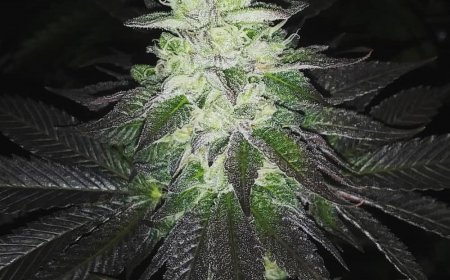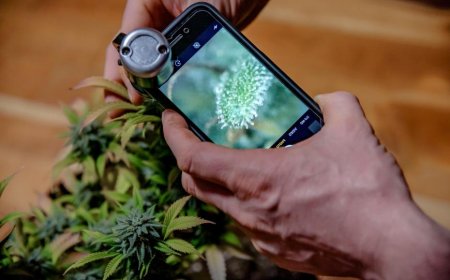Understanding Magic Mushroom Slang
Dive into the world of Understanding Magic Mushroom Slang with our comprehensive guide, exploring historical significance, cultivation methods, and more!
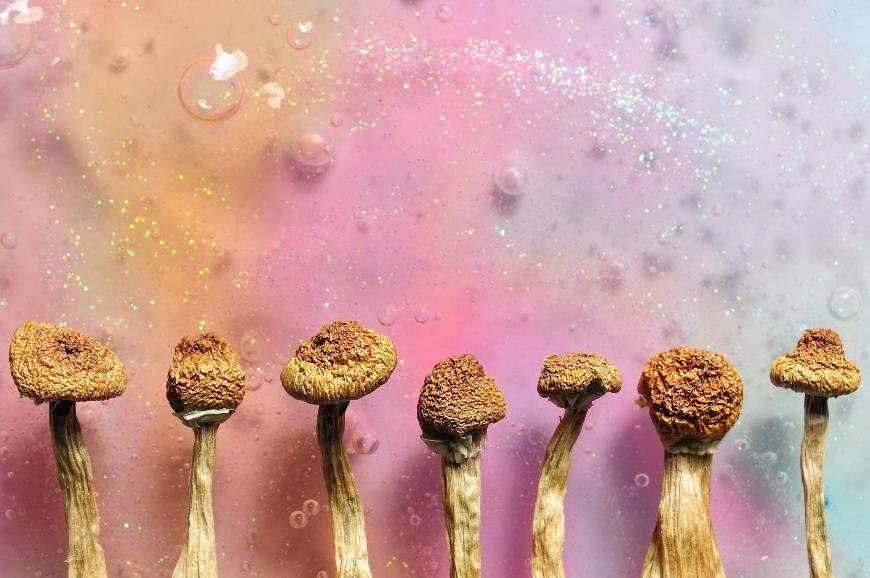
Understanding Magic Mushroom Slang is essential for anyone interested in exploring the world of psilocybin mushrooms. These fascinating fungi have a rich history and a wide range of slang terms associated with their cultivation, consumption, and effects. In this blog post, we'll dive deep into the A-Z list of magic mushroom slang terms to help you become well-versed in shroom lingo.
We'll also explore the historical significance of magic mushrooms and how they've influenced various cultures throughout time. You'll learn about the meaning behind some popular shroom slang phrases and discover different methods for cultivating and consuming these potent hallucinogenic drugs.
As we delve into the evolution of shroom slang over time, you'll gain insight into how language has shaped our understanding of these mystical substances. By comprehending magic mushroom slang, you will not only enhance your knowledge but also foster better communication within communities that appreciate these unique fungi. So get ready to embark on an enlightening journey through our comprehensive guide to Understanding Magic Mushroom Slang!
Table of Contents:
- Uncovering the Fascinating History of Magic Mushrooms
- The Modern Era of Magic Mushrooms
- The Future of Magic Mushrooms
- Understanding the Meaning Behind Shroom Slang
- Cultivation and Consumption of Magic Mushrooms
- Shroom Slang: A Trip Through Time
- Understanding Magic Mushroom Slang: Why It's Beneficial
- Unlocking the World of Magic Mushroom Slang Terms
- Conclusion
Magic mushrooms have been used for centuries across various cultures due to their potent psychedelic effects. From ancient rituals in Mexico's Mazatec region to modern-day recreational use worldwide, these fungi continue to captivate users seeking spiritual enlightenment or simply a good trip.
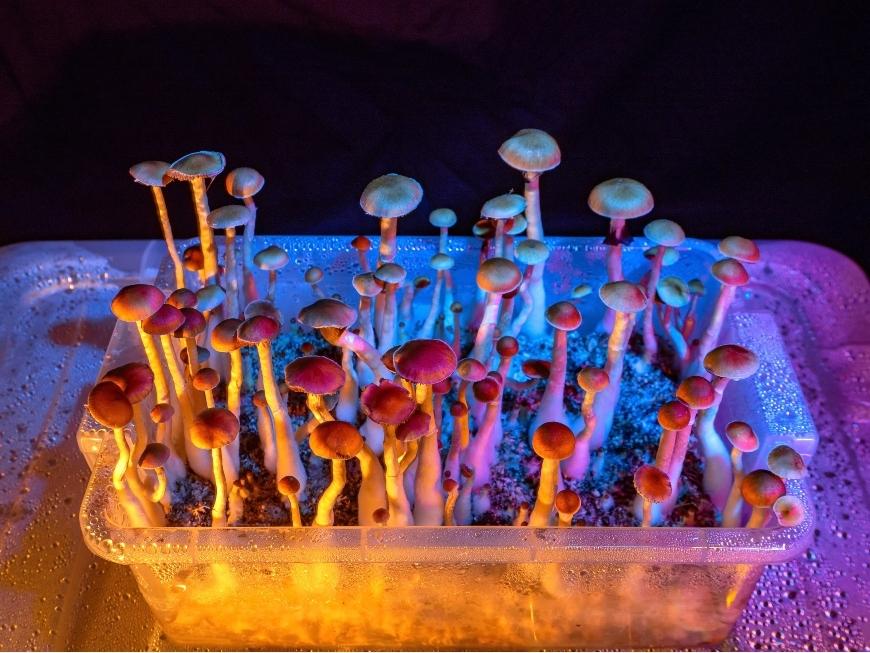
The slang surrounding magic mushrooms has evolved over time as well. For example, "shrooms" was once primarily associated with Psilocybe semilanceata (also known as Liberty Caps), but now it generally refers to any species containing psilocybin. Similarly, "tripping" was once a term used exclusively for LSD experiences but has since been adopted by the magic mushroom community.
Understanding the slang associated with magic mushrooms can help you better navigate conversations and online forums related to this fascinating world. By staying informed about current terminology, you'll be able to engage more effectively with fellow enthusiasts and gain valuable insights into cultivation techniques, consumption methods, and other aspects of shroom culture.
In addition to learning about slang terms, it's essential to educate yourself on the effects of different mushroom species as well as safe dosing practices. As always, remember that consuming magic mushrooms carries inherent risks and should be done responsibly.
Uncovering the Fascinating History of Magic Mushrooms
Magic mushrooms, or "shrooms," have a rich and intriguing history that spans thousands of years. These psychoactive fungi, comprising of psilocybin and psilocin, have been employed in multiple societies for spiritual healing and other reasons.
In Mesoamerica, ancient civilizations like the Aztecs and Mayans revered magic mushrooms as sacred tools for connecting with deities. They called these hallucinogenic fungi teonanacatl, which translates to "flesh of the gods." Similarly, indigenous tribes in Siberia consumed fly agaric mushrooms (Amanita muscaria) during shamanic rituals to induce altered states of consciousness.
European art from the Middle Ages also suggests that magic mushrooms were known and potentially utilized by certain groups. For example, some scholars believe that the Plaincourault fresco in France depicts Psilocybe semilanceata species due to its distinct appearance.
The Modern Era of Magic Mushrooms
The use of magic mushrooms has continued into modern times. In 1957, R. Gordon Wasson's article "Seeking The Magic Mushroom" introduced Western readers to Mazatec shaman Maria Sabina's mushroom ceremonies in Mexico. This exposure led to increased interest among researchers such as Albert Hofmann (discoverer of LSD), who isolated psilocybin from Mexican mushroom samples.
Subsequently, the counterculture movement of the 1960s embraced magic mushrooms as a tool for spiritual exploration and personal growth.
The Future of Magic Mushrooms
Nowadays, scientific inquiry into the therapeutic advantages of psilocybin is intensifying, as public opinion evolves towards acceptance of these fungi's curative properties. Research has demonstrated encouraging outcomes in treating psychological health conditions, such as stress, sadness and PTSD. As public perception shifts towards acceptance of these fungi's healing properties, it becomes increasingly important to understand their historical significance and cultural context.
Understanding the Meaning Behind Shroom Slang
The world of magic mushrooms is filled with unique slang terms that may be confusing to newcomers. By understanding these expressions, you'll gain a deeper insight into the culture and practices surrounding shrooms. In this section, we'll examine some of the key terminology used in relation to magic mushrooms.
- Boomers: A term used to describe Psilocybe cubensis mushrooms due to their large size compared to other species.
- Caps: Refers to the top part of a mushroom's fruiting body, which contains most of its psychoactive compounds like psilocybin and psilocin.
- Fruiting Body: The visible part of a mushroom that grows above ground or on another substrate; it produces spores for reproduction.
- Mycelium: The vegetative part of fungi consisting of thread-like structures called hyphae; mycelium colonizes substrates before producing fruiting bodies
- Pins: Young, developing mushrooms that have not yet fully grown; they resemble small pins protruding from the substrate.
- Spore Print: A collection of spores taken from a mature mushroom cap by placing it on paper or foil; this can be used as inoculum for future cultivation.
Cultivation and Consumption of Magic Mushrooms
When it comes to magic mushrooms, there are various species with unique psychedelic effects. Some of the most popular species include Psilocybe cubensis, Psilocybe semilanceata, and Psilocybe azurescens. Each mushroom strain has its own distinct potency levels and characteristics.
Cultivating Magic Mushrooms
Want to grow your own psychedelics? Cultivating magic mushrooms can be a rewarding experience. Home cultivators typically use the PF Tek method (using brown rice flour cakes) or the monotub technique (using bulk substrates). Both methods require sterile conditions, proper substrate preparation, inoculation with spores or mycelium culture, incubation at optimal temperatures, fruiting under appropriate humidity levels and lighting conditions.
Consumption Methods
Many people prefer eating fresh or dried mushrooms directly. However, some individuals find the taste unpalatable or have difficulty digesting them. Alternative consumption options include making a tea from steeped shroom pieces (shroom tea) or grinding dried shrooms into powder to create capsules (shroom capsules). Another popular method is magic mushroom chocolate, which involves melting chocolate, mixing in ground shrooms, and allowing the mixture to cool and solidify.
Dosage
It's essential to be aware of the dosage when consuming shrooms. A typical recreational dose ranges from 1-2 grams of dried shrooms for a mild experience or up to 5 grams for a more intense trip. Beginners or those trying a new variety should begin with a smaller dose. Remember that factors such as body weight, metabolism, tolerance levels, and individual sensitivity can influence how one experiences the effects of psilocybin mushrooms.
Shroom Slang: A Trip Through Time
The language surrounding magic mushrooms has evolved over time, reflecting changes in society and culture. As new generations discover the world of psychedelics, they often create their own slang terms to describe their experiences. This evolution not only fascinates but also helps us understand how perceptions of magic mushrooms have shifted throughout history.
The 60s and 70s: Shrooms, Boomers, and Caps
During the height of psychedelic counterculture, terms like "shrooms," "boomers," and "caps" became popular as people sought alternative ways to expand their consciousness. The use of these words reflected a growing interest in exploring altered states through natural substances like psilocybin mushrooms.
Species and Strains: Cubes, Blue Meanies, and Flying Saucers
As scientific research into psychedelics increased, more specific terminology emerged to describe different species or strains of magic mushrooms. Common species of magic mushrooms include Psilocybe cubensis ("cubes" or "golden teachers"), Panaeolus cyanescens ("blue meanies"), and Psilocybe azurescens ("flying saucers") - each named for their physical characteristics and effects. These names reflect both physical characteristics and subjective effects associated with each strain.
New Slang for a New Era: Microdots and Zoomers
Recently, a surge in fascination with psychedelics has arisen, with an increasing number of individuals experimenting with microdosing and other novel applications for magic mushrooms. This has led to the creation of new slang terms like "microdots" (small doses of psilocybin) and "zoomers" (a playful term for those who consume shrooms).
Understanding the evolution of shroom slang is essential not only for staying informed about current trends but also appreciating the rich history behind these fascinating fungi. As more research continues to emerge on the potential therapeutic benefits of psilocybin, it's likely that our language will continue to evolve alongside our understanding.
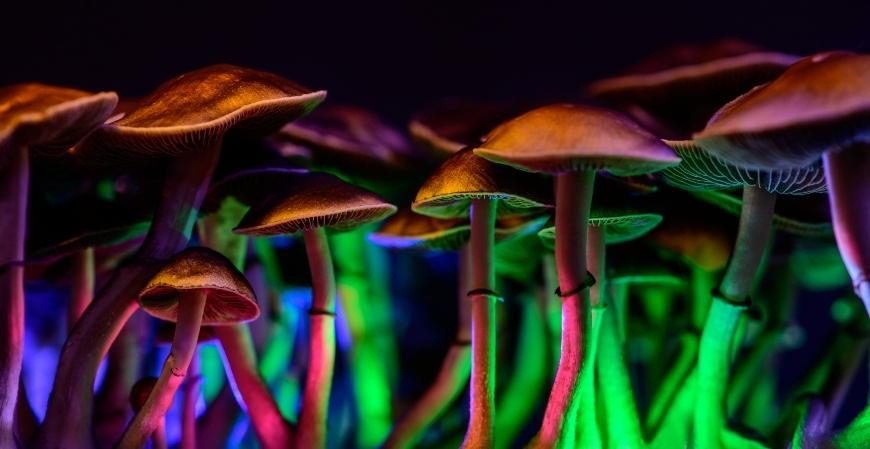
Understanding Magic Mushroom Slang: Why It's Beneficial
For those interested in the world of magic mushrooms, learning shroom slang can be incredibly advantageous. By familiarizing yourself with the terminology, you'll stay up-to-date on new advancements and be able to converse more fluently with fellow shroomers.
Knowing these terms can make your conversations with other users more engaging and enjoyable. By using the appropriate slang, you'll be able to discuss various aspects of magic mushrooms - from cultivation techniques to consumption methods - without any confusion or misunderstandings.
A solid grasp on shroom slang will also enable you to navigate online forums and social media groups dedicated to psychedelics more easily. These platforms are often filled with experienced growers and users who share valuable tips, tricks, and advice on everything related to magic mushrooms. Being familiar with common terms will allow you to participate in these discussions confidently and learn from others' experiences.
Enhancing Your Magic Mushroom Experience
Beyond communication benefits, understanding mushroom lingo can also enhance your overall experience when consuming them recreationally or for spiritual purposes. For instance:
- You'll have a better idea of what effects different strains might produce based on their nicknames (e.g., "Golden Teacher" vs "Penis Envy").
- You'll know how certain consumption methods may alter the intensity or duration of a trip (e.g., "lemon tekking" vs eating them raw).
In addition, being well-versed in shroom slang can help keep you safe by allowing you to identify potentially dangerous practices or substances that should be avoided. For example, you might come across a term like "wood lover's paralysis" and learn that it refers to a temporary but potentially distressing side effect some users experience after consuming certain species of magic mushrooms.
Where to Learn Magic Mushroom Slang
Though slang terms may differ between locations and even among people, it's always prudent to ask for clarification if you don't comprehend a particular expression. Ultimately, understanding the language of magic mushrooms can enrich your experiences with these fascinating fungi and help you become a more knowledgeable, responsible user. So why not dive in and start exploring the world of shroom slang today?
Unlocking the World of Magic Mushroom Slang Terms
Welcome to the fascinating world of magic mushrooms, where a whole new language awaits you. Understanding shroom slang is crucial for anyone interested in exploring this realm. This guide will help you navigate through the various terms and expressions associated with magic mushrooms, giving you a deeper understanding of their cultural significance and use.
As with any subculture, slang plays an important role in connecting people who share common interests. Slang is a key part of the magic mushroom culture, just like any other subculture. By familiarizing yourself with magic mushroom slang terms, you'll be able to communicate more effectively with fellow enthusiasts and gain valuable insights into cultivation techniques, consumption methods, and even historical context.
Shroom Slang Terms to Know
- Amanita Muscaria: A species of psychoactive mushroom known for its red cap covered in white spots; also called "fly agaric."
- Boomers: A colloquial term for Psilocybe cubensis mushrooms or other psychedelic varieties.
- Caps: The top part of a mushroom containing most of its psychoactive compounds; often used as shorthand when discussing dosage amounts.
- Dosage: The amount (usually measured in grams) needed to achieve desired effects from consuming magic mushrooms.
- Fruiting Body: The visible part of a fungus that produces spores; includes both caps and stems when referring to magic mushrooms.
Various terms associated with magic mushrooms exist, including some which are less well-known. There are countless other terms related to growing conditions (e.g., mycelium), harvesting techniques (e.g., spore prints), and even the effects of magic mushrooms themselves (e.g., ego death, visuals). As you continue to explore this world, your vocabulary will naturally expand.
Understanding shroom slang is not only useful for communication purposes but also helps build a sense of community among those who share a passion for magic mushrooms. By learning these terms and their meanings, you'll be better equipped to engage in conversations with fellow enthusiasts and contribute valuable insights based on your own experiences. So dive into this guide and start expanding your magic mushroom lexicon today.
Conclusion
Get ready to trip out with this guide to magic mushroom slang, perfect for those who want to understand the lingo of the drug culture. From 'Boomers' to 'Shrooms' to 'Mushies,' this article explores the historical significance of magic mushrooms, cultivation and consumption methods, and the evolution of shroom slang over time.
Whether you're a seasoned psychonaut or a curious newbie, understanding these terminologies can enhance your experience and help you connect with others in the community. So, put on your tie-dye shirt, grab your favorite Grateful Dead album, and let's dive into the world of magic mushroom slang!

